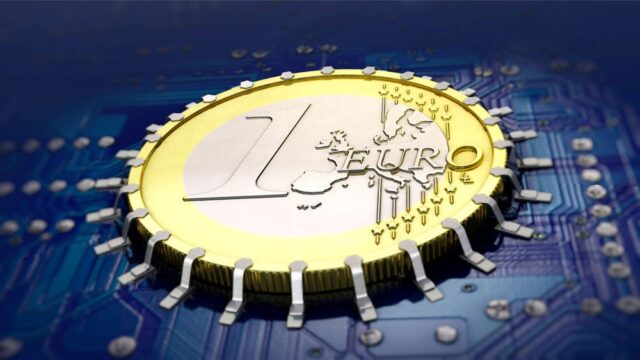As the European Central Bank (ECB) accelerates its plans to launch the digital euro, a new currency battle is brewing. A battle not against foreign economies, but within the Eurozone itself. While the ECB envisions the digital euro as a unifying tool to modernize Europe’s economy, some EU member states are pushing back. They are concerned that the initiative could encroach on their fiscal autonomy. This struggle highlights deeper questions about sovereignty and centralization within the EU. Leaders seek to balance national interests with Europe’s collective vision for a digital future.
ECB’s Vision for the Digital Euro
The ECB’s plans for the digital euro form part of a broader strategy to modernize Europe’s financial landscape. By introducing a central bank digital currency (CBDC), the ECB aims to provide an accessible, secure, and efficient payment option. It wants to reduce the reliance on cash and strengthen the Eurozone’s economic independence in an increasingly digital world. ECB President Christine Lagarde and other ECB officials have touted the digital euro as a way to reinforce Europe’s competitiveness, safeguard its economy against foreign currency influence, and ultimately enhance the Eurozone’s global financial standing.
However, as details of the digital euro proposal have emerged, so have questions about the ECB’s level of control. The ECB envisions a centralized framework where it would play a significant role in overseeing digital euro transactions. It would manage privacy protocols, and implement monetary controls. This level of oversight has raised concerns among several EU member states, sparking an ongoing debate about the balance of power within the Eurozone.
EU Member States’ Concerns over Centralized Control
The primary friction point lies in the extent of the ECB’s authority over the digital euro. EU member states, particularly those with strong national banking systems and financial traditions, are wary of ceding too much control to the ECB. Many national governments argue that if the digital euro becomes too centralized under the ECB’s authority, it could diminish their fiscal autonomy. It could impact their ability to manage local financial regulations and banking operations.
Countries like Germany and France have raised concerns about the potential impact of an ECB-led digital euro on their national economies. Some worry that a highly centralized CBDC could weaken the role of local banks, placing key financial decisions under the ECB’s jurisdiction. Such a shift might restrict national regulators’ ability to address domestic financial issues, fueling fears of a loss of sovereignty within Europe’s already complex regulatory landscape.
Balancing National Interests and EU Unity
The divide over the digital euro reflects broader challenges within the EU: how to integrate innovative technologies while respecting the unique political and economic circumstances of each member state. There is shared support for modernizing Europe’s financial infrastructure. However, many leaders feel that national considerations are being sidelined in the rush toward a unified CBDC.
This clash isn’t merely theoretical. Should the ECB assume control over the digital euro without input from national governments, member states fear a new precedent could be set for centralization, with future decisions on financial policies resting in fewer hands. The resulting pushback from some national governments highlights a desire to preserve fiscal sovereignty. They want to ensure that decisions affecting local economies are not made exclusively at the EU level.
A Cato Institute report suggests that introducing a digital euro could fundamentally shift the balance of power within the EU’s financial system, with potential long-term impacts on national policymaking. Some argue that this centralization could lead to decreased flexibility for EU nations to address localized economic needs. It would make their economies more vulnerable in times of crisis.
Privacy and Public Trust: Another Layer of Complexity
Beyond sovereignty concerns, privacy and public trust have become central topics in the debate over the digital euro. For the ECB, building public confidence in the digital euro requires assurances that user data will be protected. However, achieving this while ensuring the transparency required to prevent fraud presents a difficult balancing act.
National governments are wary that the ECB’s proposed system could enable excessive data monitoring, further complicating the dialogue over control. These concerns aren’t just theoretical. Many observers note that the ECB’s approach could reshape how personal financial data is managed across the EU. There is widespread apprehension that centralized control over financial data could conflict with national data protection laws. This raises sovereignty issues and complicates the digital euro’s rollout.
Potential Compromises and Future Pathways
To address these sovereignty and control concerns, the ECB has indicated a willingness to engage with EU member states and adapt the digital euro framework to be more inclusive. However, the pathway to consensus remains unclear. Some proposals suggest a tiered approach to the digital euro’s control structure. National central banks could retain some oversight over local transactions while the ECB oversees broader monetary policy. This approach could allow the digital euro to function within the EU’s varied financial landscape while maintaining local regulatory power.
Christine Lagarde has emphasized the need for collaboration to make the digital euro a successful and unifying currency. According to sources like the Atlantic Council and Banque de France, the ECB is already exploring potential avenues for cooperation with national banks and government bodies to create a digital currency that aligns with both regional and continental interests. However, it’s unclear whether these efforts will fully address the sovereignty concerns that continue to shape the debate.
The Road Ahead
The digital euro debate is likely to shape the future of European finance, setting precedents for how digital currency projects are approached within complex political unions. For now, the ECB faces a delicate balancing act: it must advance its vision of a modernized, unified Eurozone financial system while addressing the concerns of member states wary of ceding too much control. As discussions progress, the outcome will be crucial for Europe’s digital economy, potentially redefining the power dynamics of the EU’s financial landscape.
>>> Read more: Europe Bitcoin Ban: ECB Urges Regulation Over Wealth Inequality
Ultimately, the digital euro represents more than a new payment method—it symbolizes a pivotal moment in Europe’s financial evolution. Whether the project will bridge or deepen the existing divides remains to be seen. The journey to consensus is likely to be as complex and layered as the Eurozone itself.
Readers’ frequently asked questions
Why does the ECB want such centralized control over the digital euro, and what benefits does it see in this approach?
The ECB is pushing for centralized control over the digital euro to establish a unified, stable, and secure currency across the Eurozone. Centralizing oversight allows the ECB to enforce consistent rules for the digital euro, ensuring its value and function across all EU member states. This approach aligns with the ECB’s mission to manage monetary policy for the Eurozone. That includes ensuring that digital euro transactions support financial stability and mitigate risks like money laundering and fraud. Centralization also allows the ECB to implement advanced privacy and security measures across the entire region. It would apply a uniform standard, preventing loopholes in regulatory compliance. In the ECB’s view, centralized control offers a way to achieve an efficient, reliable digital currency that strengthens Europe’s competitiveness in a rapidly evolving digital economy.
How would the digital euro affect traditional banks and their role in the Eurozone’s financial system?
Introducing a digital euro could significantly impact traditional banks, especially if it becomes a popular choice among consumers. One key concern is that widespread use of the digital euro might lead to declining deposits held at commercial banks. Since banks rely on deposits to fund loans, shifting toward the digital euro could reduce their lending capacities. That might destabilize the traditional banking sector. If the ECB issues the digital euro directly, consumers may see it as a safer alternative to bank deposits, particularly during economic downturns. This could further impact banks’ stability. To counter these effects, some proposals suggest allowing banks to act as intermediaries in the digital euro system. It would keep them engaged in deposit-taking and lending while giving consumers access to a digital currency. The exact impact would depend on the digital euro’s structure and any safeguards designed to protect the banking sector’s role in the financial ecosystem.
Could the digital euro offer enhanced privacy compared to existing digital payment systems?
The digital euro could indeed offer improved privacy, but this aspect depends heavily on how the ECB and EU regulators approach privacy safeguards. Unlike private digital payment systems, which often collect and monetize user data, the ECB has stated that it prioritizes public trust and data protection. The ECB aims to design the digital euro with advanced privacy features. Users should have secure, private access to their digital funds without compromising the transparency required for regulatory compliance. However, achieving this balance is challenging. The ECB wants to protect user data, but it also needs a degree of transaction transparency to prevent illicit activities. Currently, one proposed solution is to adopt a tiered privacy model. Smaller transactions would maintain a higher level of privacy, while larger transactions would involve more oversight. While specifics are still under discussion, the digital euro’s design could set a new privacy standard in digital payments by effectively protecting user data while meeting compliance requirements.
What Is In It For You? Action Items You Might Want to Consider
Keep an Eye on European Banking Stocks
As the digital euro progresses, it could impact traditional banks, especially if ECB policies shift deposit behaviors or lending structures. Consider monitoring European banking stocks closely, as any significant adoption of the digital euro might affect these institutions’ financial positions. If the ECB moves forward with a centralized digital currency, bank stocks could see shifts. These might present either risks or opportunities depending on their adaptability.
Watch for Euro Volatility in Forex Markets
The digital euro could introduce new dynamics in the forex market, especially as debates over control and implementation continue. This development might influence traders’ confidence in the euro, leading to potential volatility. Consider adjusting your forex strategies to account for any regulatory announcements or progress updates on the digital euro. These could trigger short-term price movements.
Consider Opportunities in Privacy-Focused Digital Assets
Privacy concerns surrounding the digital euro could generate increased interest in decentralized, privacy-focused digital assets. As the ECB works to balance transparency with privacy, some users might look to alternatives that prioritize privacy more overtly. Keep an eye on privacy coins and similar assets; they could gain traction as users seek options outside the scope of central bank oversight, creating potential trading opportunities.










